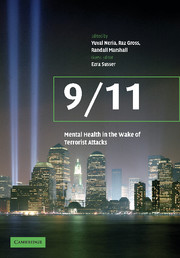Book contents
- Frontmatter
- Contents
- Acknowledgments
- Editors brief bio
- List of contributors
- Foreword
- Part I Introduction
- Part II The psychological aftermath of 9/11
- Part III Reducing the burden: community response and community recovery
- Part IV Outreach and intervention in the wake of terrorist attacks
- Part IV A New York area
- Part IV B Washington, DC
- Part IV C Prolonged-exposure treatment as a core resource for clinicians in the community: dissemination of trauma knowledge post-disaster
- Part V Disasters and mental health: perspectives on response and preparedness
- 29 The epidemiology of 9/11: technological advances and conceptual conundrums
- 30 Searching for points of convergence: a commentary on prior research on disasters and some community programs initiated in response to September 11, 2001
- 31 What mental health professionals should and should not do
- 32 Coping with the threat of terrorism
- 33 Life under the “new normal”: notes on the future of preparedness
- 34 Lessons learned from 9/11: the boundaries of a mental health approach to mass casualty events
- 35 Learning from 9/11: implications for disaster research and public health
- Index
32 - Coping with the threat of terrorism
from Part V - Disasters and mental health: perspectives on response and preparedness
Published online by Cambridge University Press: 27 October 2009
- Frontmatter
- Contents
- Acknowledgments
- Editors brief bio
- List of contributors
- Foreword
- Part I Introduction
- Part II The psychological aftermath of 9/11
- Part III Reducing the burden: community response and community recovery
- Part IV Outreach and intervention in the wake of terrorist attacks
- Part IV A New York area
- Part IV B Washington, DC
- Part IV C Prolonged-exposure treatment as a core resource for clinicians in the community: dissemination of trauma knowledge post-disaster
- Part V Disasters and mental health: perspectives on response and preparedness
- 29 The epidemiology of 9/11: technological advances and conceptual conundrums
- 30 Searching for points of convergence: a commentary on prior research on disasters and some community programs initiated in response to September 11, 2001
- 31 What mental health professionals should and should not do
- 32 Coping with the threat of terrorism
- 33 Life under the “new normal”: notes on the future of preparedness
- 34 Lessons learned from 9/11: the boundaries of a mental health approach to mass casualty events
- 35 Learning from 9/11: implications for disaster research and public health
- Index
Summary
The terrorist attacks on September 11, 2001 created fear, dread, and uncertainty among most Americans. Although many Americans have been aware of terrorism in the world, it is unprecedented for Americans to feel unsafe at home and abroad. Indeed, terrorist groups have launched a total of 3300 attacks on US targets since 1968. However, on 9/11, more than three times the number of Americans were killed than those that died in terrorist attacks over the last 33 years (Hoffman, 2002).
Since September 11, 2001, the threat of another terrorist attack has been a chronic stressor for many. For example, about two-thirds of Americans report fears of future terrorism (Silver et al., 2002) and 44% think that terrorism will increase over the next few years (Schuster et al., 2001). Fears of future terrorism are not limited to adults. Following the attacks on 9/11, 47% of children were worried about their own safety or the safety of a loved one, and there was a significant association between child and adult stress (Schuster et al., 2001). The terrorist events on 9/11 and their aftermath, including wars in Afghanistan and Iraq and the uncertainty of future attacks on the US, have led to increased feelings of insecurity, fearfulness, and anxiety among many Americans.
How can Americans cope with this ongoing threat of terrorism? Is having some anxiety and vigilance normative? Are there forms of adaptation to the threat of terrorism that do not result in optimal mental health or functioning? Can we learn any lessons from how citizens in other countries cope with the chronic threat of terrorism?
- Type
- Chapter
- Information
- 9/11: Mental Health in the Wake of Terrorist Attacks , pp. 570 - 591Publisher: Cambridge University PressPrint publication year: 2006
- 3
- Cited by

